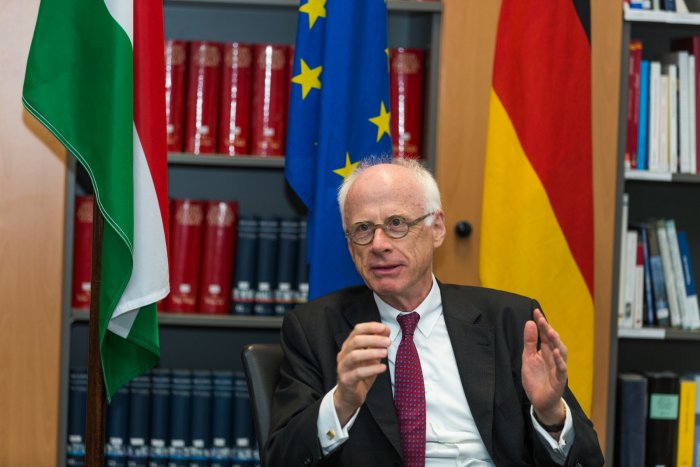Ambassador: German Companies Moving Focus to R&D in Hungary

Just ahead of the October 3 National Day of the Federal Republic of Germany (also this year the 30th anniversary of the reunification of East and West Germany) newly arrived Ambassador Johannes Haindl gives his first interview to the Budapest Business Journal on the state of bilateral relations.
Johannes Haindl
BBJ: What are the major investment sectors for German companies in Hungary, how much has been invested and how many jobs created? Have the sectors changed over the years?
Johannes Haindl: Germany is Hungary’s most important investor. In 2018, Germany made direct investments amounting to EUR 1.2 billion. In consequence, the total amount of German direct investments rose to around EUR 19 bln. This makes up to 20 % of the total foreign direct investment. More than a third of this sum was invested in the automotive sector. A fifth was spent in processing companies. All in all, about 3,500 German companies are doing business in Hungary, with more than 250,000 employees.
Nowadays, German companies focus increasingly on research and development projects rather than on sole production. Bosch, as an example, invested EUR 120 million in its engineering center in Budapest two years ago in order to expand R&D with regards to autonomous driving and electric mobility. Besides this, German companies have increased their cooperation with Hungarian universities and schools. One success story was the introduction of the German concept of dual vocational training, including theoretical education in schools and practical learning on the job.
BBJ: Most people will know about the heavy German investment in the automotive industry (Audi, BMW, Bosch, Mercedes etc.). Are there other less high profile sectors that it might surprise our readers to learn about?
JH: One example of successful German investment is AviAlliance, currently holding a 55% stake of Budapest Airport Zrt (BUD). Within the last 12 months, BUD has invested more than EUR 100 mln in various development projects for the international airport. Recently, with the completion of Pier 1, a modern boarding gate has been established, as well as BUD Cargo City with new and efficient facilities for freight handling.
Another example is the construction of “Lajtania Park”, established near Hegyeshalom by the German companies FAKT AG and E.ON SE, together with KÉSZ group from Budapest. On an area covering 330 hectares, one of the biggest horticultural centers in Central Europe with a future-oriented agricultural concept shall be constructed. The investment volume amounts to EUR 1 bln.
BBJ: What is the picture for Hungarian investment in Germany? What sectors are involved and what are the figures?
JH: Hungarian investments in Germany, mostly in industrial production and energy, have decreased over the past years. In 2017, EUR 3.2 bln was invested, whereas this figure shrank to only EUR 1.75 bln in 2019. A good example is MOL Group’s 2019 acquisition of Aurora, a medium-sized German company, recycling plastic and producing high-level technical plastic compounds in its facilities in Baden-Württemberg.
BBJ: How badly affected has bilateral trade been by the COVID-19 pandemic, and how long do you think it might take to recover?
JH: The COVID-19 pandemic has had a negative effect on the bilateral trade. In comparison to the same period of the previous year, Hungarian exports to Germany have sunk by around 25%. German exports to Hungary fell by more than 30%. In the long-term, the numbers will surely rise again. The recovery time depends on the further development of the COVID-19 pandemic. Any containment of the virus and the production of a vaccine will accelerate this process.
BBJ: Hungarian Prime Minister Viktor Orbán and German Chancellor Angela Merkel have not always agreed with one other. What are the biggest challenges in bilateral relations right now?
JH: Germany and Hungary have a long common history. We are both members of the European Union. Currently, Germany holds the [six-month rotating] Presidency in the Council of the European Union. The way the EU has managed the COVID-19 pandemic so far gives me confidence. No region in the world has shown as much solidarity as we have in the European Union. Because the virus doesn‘t know any borders, we will need European virtues to manage the crisis. As our Presidency motto puts it: “Together for Europe’s recovery”!
BBJ: Is Hungary considered to be a stable and transparent investment destination?
JH: For years, there have been continuous investments by German companies in Hungary, showing the general trust in Hungary as an investment destination. However, according to the German-Hungarian Chamber of Commerce’s fall 2019 figures, more than 40% of the interviewed companies expect the medium-term economic development of Hungary to deteriorate. Only 22% expect it to enhance. This is certainly a development which requires a thorough analysis.
BBJ: Clearly, Hungarian laws are the responsibility of Hungarian legislators, but are there any areas where you are lobbying for change?
JH: Having been in this wonderful country only for a couple of weeks, I am still in the process of getting familiar with the peculiarities of Hungary.
BBJ: Is there anything else you would like to tell our readers?
JH: This year we celebrate 30 years of German reunification. We have not forgotten that it was here in Hungary that the first stone was knocked out of the Wall. We look back with gratitude on the past 30 years in which, together with our partners, we have succeeded in making reunification in a united Europe a reality. At the same time, we want to look ahead and help Hungarians and Germans continue their lives in a strong Europe of peace, freedom and prosperity.
Speaking Diplomatically
Johannes Konrad Haindl presented his credentials as the Ambassador of the Federal Republic of Germany to Hungaryʼs President János Áder on July 3. He has previously served as Ambassador in the Czech Republic and, from 2015-19, in Austria. According to the Eurasia Review website, Haindl, a former journalist, has enjoyed a diplomatic career of more than 30 years. He previously worked at the German embassy in the former Yugoslavia, and also led the German foreign ministry’s department for south-east Europe and Turkey. In 2016 he was appointed by the German foreign ministry as that countryʼs special envoy, working alongside European Union and United Statesʼ representatives to help resolve the then political crisis in what is now North Macedonia.
SUPPORT THE BUDAPEST BUSINESS JOURNAL
Producing journalism that is worthy of the name is a costly business. For 27 years, the publishers, editors and reporters of the Budapest Business Journal have striven to bring you business news that works, information that you can trust, that is factual, accurate and presented without fear or favor.
Newspaper organizations across the globe have struggled to find a business model that allows them to continue to excel, without compromising their ability to perform. Most recently, some have experimented with the idea of involving their most important stakeholders, their readers.
We would like to offer that same opportunity to our readers. We would like to invite you to help us deliver the quality business journalism you require. Hit our Support the BBJ button and you can choose the how much and how often you send us your contributions.








